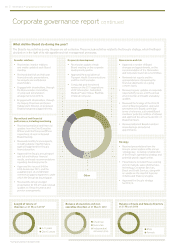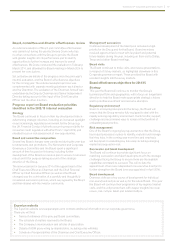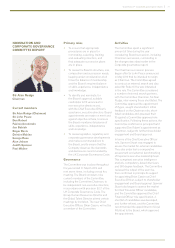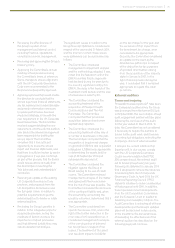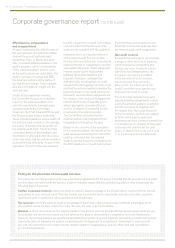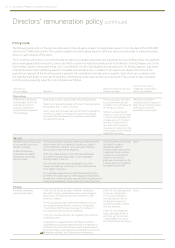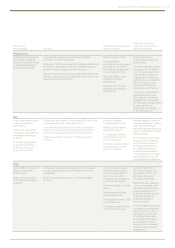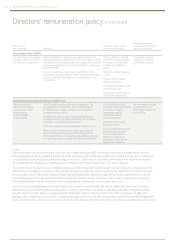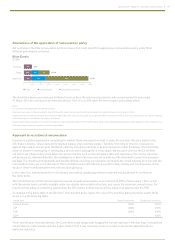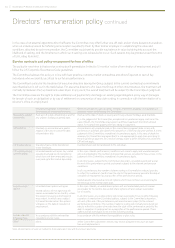Experian 2014 Annual Report Download - page 80
Download and view the complete annual report
Please find page 80 of the 2014 Experian annual report below. You can navigate through the pages in the report by either clicking on the pages listed below, or by using the keyword search tool below to find specific information within the annual report.
76
Effectiveness, independence
and reappointment
As part of assessing the effectiveness of
the audit process, the Audit Committee
reviews the annual audit plan each
September. Then, in March and April/
May, it receives detailed updates on the
audit’s progress, which include details
of the external auditors’ actions, such
as the audit procedures undertaken, the
audit’s coverage of revenue and EBIT,
the locations visited and the status of
any significant findings. These updates
give the Committee an insight into the
audit process.
Finally, at the September meeting,
the Committee receives an evaluation
report on the external auditors. This
year, this was done by issuing tailored
questionnaires to the Committee
Chairman, the Chief Financial Officer and
the Group’s senior finance leadership.
These included questions on the quality of
the audit process, in terms of its coverage,
the quality of delivery and the quality of
the external audit team. The Committee
concluded, based on this feedback and
information it obtained during the course
of its other work, that the external auditors
were performing effectively. As part of the
evaluation, the Committee also reviewed
the FRC’s Guidance on Audit Committees,
and concluded that the Group and the
auditors had complied with the guidance.
Independence is an important element
of the external audit. The Committee
monitors this during the year, by reviewing
potential threats to independence and the
associated safeguards. These safeguards
include assessing the relationships
between the external auditors and
Experian, having no contingent fee
arrangements, ensuring that non-audit
services fall within agreed monetary limits
and that the external auditors consider the
potential impact of non-audit services on
their audit services. Other safeguards are
the rotation of the lead audit engagement
partner and the use of separate teams,
where appropriate. Experian also has
a policy in respect of employing former
employees of the external auditor.
The Committee concluded that the
external auditors had maintained their
independence throughout the year.
Based on the outcome of the evaluation
of the external auditors, the reports on the
audit process reviewed by the Committee
and the conclusion that the external
auditors and the Group had complied with
the FRC’s Guidance on Audit Committees,
the Committee recommended to the
Board (for shareholder approval) that
the external auditors be reappointed.
Non-audit services
PricewaterhouseCoopers LLP provides
a range of other services to Experian,
which include tax compliance and
advisory services. To ensure auditor
objectivity and independence, the
Company has a policy in relation
to the provision of such services,
which includes financial limits
above which the Chairman of the
Audit Committee must approve any
proposed non-audit services.
The Committee receives half-yearly
reports detailing assignments carried
out by the external auditors in addition
to their normal work, together with
the related fees. Non-audit fees paid
to the Company’s auditors are capped
at 100% of the fees for audit and
assurance services, except in exceptional
circumstances. An analysis of fees paid
to the external auditors for the year
ended 31 March 2014 is set out in note
11 to the Group financial statements.
Policy on the provision of non-audit services
This policy has not changed during the year and remains appropriate for the Group. Provided that the provision of non-audit
services does not conflict with the external auditors’ statutory responsibilities and ethical guidance, they may provide the
following types of services:
Further assurance services: where the external auditors’ deep knowledge of the Group’s affairs means that they may be
best placed to carry out such work. This may include, but is not restricted to, shareholder and other circulars, regulatory
reports and work in connection with acquisitions and divestments.
Tax services: where the external auditors’ knowledge of the Group’s affairs may provide significant advantages which
other parties would not have. Where this is not the case, the work is put out to tender.
General: in other circumstances, the external auditors may provide services provided that proposed assignments are put
out to tender and decisions to award work are taken on the basis of demonstrable competence and cost effectiveness.
However, the external auditors are specifically prohibited from performing work related to accounting records and financial
statements that will ultimately be subject to external audit; management of or significant involvement in internal audit
services; any work that could compromise the external auditors’ independence; and any other work that is prohibited
by UK ethical guidance.
Corporate governance report continued
Governance • Corporate governance report


